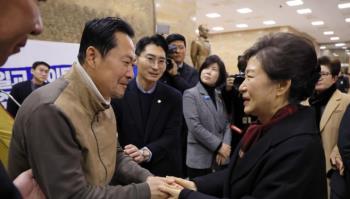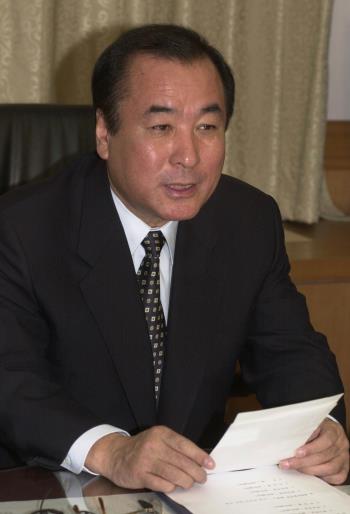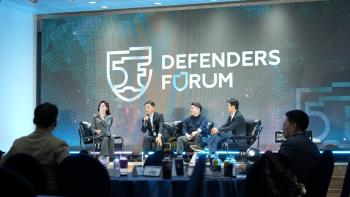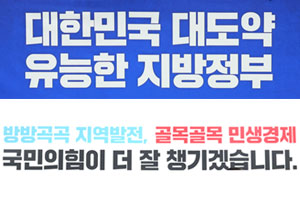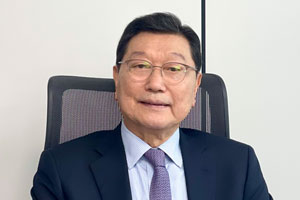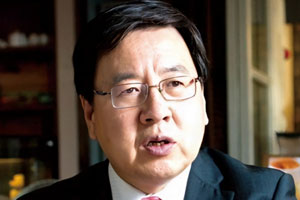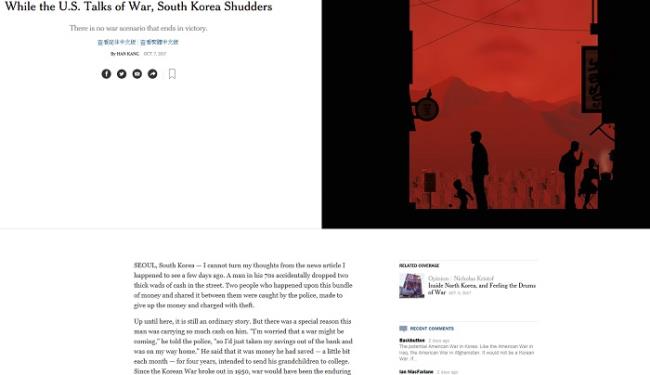
- 7일(현지시간) 미국 매체 《뉴욕타임스》에 게재한 한강 소설가의 기고문. 사진=《뉴욕타임스》 홈페이지 캡처.
소설가 한강이 7일(현지시간) 미국 《뉴욕타임스》 선데이리뷰 코너에 게재한 기고문 ‘미국이 전쟁을 말할 때 한국은 몸서리친다’가 세간의 주목을 받고 있다. 해당 기고문은 한강이 한글로 썼고, 이를 영국 번역가 데보라 스미스 씨가 영어로 번역해 옮겼다고 한다.
한강은 이번 기고문으로 국내외 독자들의 뜨거운 관심을 받고 있다. 기고문은 최근 불거지고 있는 ‘한반도 전쟁 위기설’에 대한 그녀의 생각을 담고 있어 논쟁의 불씨를 제공한 측면도 없지 않다.
한강은 지난해 작품 《채식주의자》로 세계 3대 문학상이라 불리는 영국의 ‘맨부커상’을 수상했고 올해에는 소설 《소년이 온다》로 이탈리아의 권위 있는 문학상 ‘말라파르테상’을 받았다.
청와대는 지난 8일 공식 페이스북 계정에 그녀의 기고문을 번역, 핵심을 추려 게재했다. 이후 해당 기고문의 일부 대목을 두고 온라인상에서 찬반(贊反)이 갈리는 상황이 발생했다. 이에 대해 청와대 관계자는 “대화와 평화적 해법이 필요하다는 (한강 글의) 주장과 청와대 입장이 다르지 않아 기고문을 소개한 것”이라며 “청와대가 ‘한국전쟁이 대리전’이라는 부분에 동의하는 것은 아니다”라고 밝혔다.
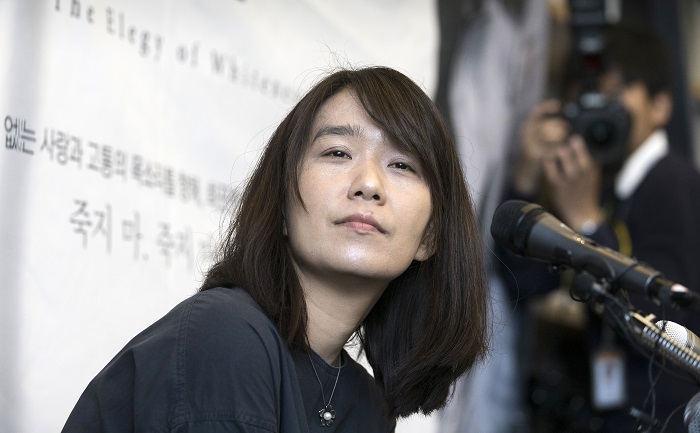
| 2016년 5월 24일 오전 한국 작가 최초로 '맨부커상'을 수상한 한강 소설가가 서울 마포구 서교동 한 카페에서 수상소감과 함께 신작 소설 '흰' 출간 기자 간담회를 갖고 있다. 사진=조선DB |
《월간조선》은 한강의 작품을 낸 출판사를 통해 기고문의 한글 원본을 요청했다. 이에 한강 측은 해당 기고문의 수록이나 게재를 원치 않는다는 입장을 전해왔다.
《월간조선》이 해당 글의 전문을 소개하는 이유는, 그녀의 기고문이 뜨거운 관심을 불러일으키며 사회적 이슈로 부상했기 때문이다. 영어로 된 기고문은 《뉴욕타임스》 홈페이지에 접속하면 누구나 자유롭게 볼 수 있다. 지금 이 순간에도 국내외 여러 독자에게 읽혀지고 있다.
《월간조선》은 영어에 다소 익숙치 못한 국내 독자들의 이해를 돕기 위해 해당 기고문을 번역·소개한다. 아무리 훌륭한 번역가라 하더라도 원 저자의 의도를 100% 반영하기란 쉽지 않다. 여기에 더해 《월간조선》 번역본은 시간적 제약과 번역 역량 부족으로 필자의 생각을 완벽히 복원하지 못했음을 먼저 밝혀둔다. 아울러 번역문 게재가 한강의 의도를 폄하·왜곡하려는 것도 아님을 밝혀둔다. 오역(誤譯) 등 잘못된 부분은 '댓글달기'를 통해 알려주시길 독자 여러분께 부탁드린다. 마지막에 청와대의 요약문도 함께 실었다.
월간조선 뉴스룸
-------------------------------------------------------------------------
1. 한강 작가가 《뉴욕타임스》에 게재한 기고문
While the U.S. Talks of War, South Korea Shudders
There is no war scenario that ends in victory.
By HAN KANGOCT. 7, 2017
I cannot turn my thoughts from the news article I happened to see a few days ago. A man in his 70s accidentally dropped two thick wads of cash in the street. Two people who happened upon this bundle of money and shared it between them were caught by the police, made to give up the money and charged with theft.
Up until here, it is still an ordinary story. But there was a special reason this man was carrying so much cash on him. “I’m worried that a war might be coming,” he told the police, “so I’d just taken my savings out of the bank and was on my way home.” He said that it was money he had saved — a little bit each month — for four years, intended to send his grandchildren to college. Since the Korean War broke out in 1950, war would have been the enduring experience of this man’s adolescence. I imagine what he would have been feeling, a man who has lived an ordinary middle-class life ever since, on his way to the bank to take out his savings. The terror, the unease, the impotence, the nervousness.
Unlike that man, I belong to the generation that never experienced the Korean War. Crossing the border to the North was already impossible before I was born, and even now it is forbidden for Southerners to meet or have contact with Northerners. For those of us of the postwar generation, the country known as North Korea is at times felt as a kind of surreal entity. Of course, rationally, I and other Southerners are aware that Pyongyang is only two hours by car from Seoul and that the war is not over but still only at a cease-fire. I know it exists in reality, not as a delusion or mirage, though the only way to check up on this is through maps and the news.
But as a fellow writer who is of a similar age to me once said, the DMZ at times feels like the ocean. As though we live not on a peninsula but on an island. And as this peculiar situation has continued for 60 years, South Koreans have reluctantly become accustomed to a taut and contradictory sensation of indifference and tension.
Now and then, foreigners report that South Koreans have a mysterious attitude toward North Korea. Even as the rest of the world watches the North in fear, South Koreans appear unusually calm. Even as the North tests nuclear weapons, even amid reports of a possible pre-emptive strike on North Korea by the United States, the schools, hospitals, bookshops, florists, theaters and cafes in the South all open their doors at the usual time. Small children climb into yellow school buses and wave at their parents through the windows; older students step into the buses in their uniforms, their hair still wet from washing; and lovers head to cafes carrying flowers and cake.
And yet, does this calm prove that South Koreans really are as indifferent as we might seem? Has everyone really managed to transcend the fear of war? No, it is not so. Rather, the tension and terror that have accumulated for decades have burrowed deep inside us and show themselves in brief flashes even in humdrum conversation. Especially over the past few months, we have witnessed this tension gradually increasing, on the news day after day, and inside our own nervousness. People began to find out where the nearest air-raid shelter from their home and office is. Ahead of Chuseok, our harvest festival, some people even prepared gifts for their family — not the usual box of fruit, but “survival backpacks,” filled with a flashlight, a radio, medicine, biscuits. In train stations and airports, each time there is a news broadcast related to war, people gather in front of the television, watching the screen with tense faces. That’s how things are with us. We are worried. We are afraid of the direct possibility of North Korea, just over the border, testing a nuclear weapon again and of a radiation leak. We are afraid of a gradually escalating war of words becoming war in reality. Because there are days we still want to see arrive. Because there are loved ones beside us. Because there are 50 million people living in the south part of this peninsula, and the fact that there are 700,000 kindergartners among them is not a mere number to us.
One reason, even in these extreme circumstances, South Koreans are struggling to maintain a careful calm and equilibrium is that we feel more concretely than the rest of the world the existence of North Korea, too. Because we naturally distinguish between dictatorships and those who suffer under them, we try to respond to circumstances holistically, going beyond the dichotomy of good and evil. For whose sake is war waged? This type of longstanding question is staring us straight in the face right now, as a vividly felt actuality.
In researching my novel “Human Acts,” which deals with the 1980 Gwangju Uprising, when the military dictatorship turned to the armed forces to suppress student protests against martial law, I had to widen the field to include documents related not only to Gwangju but also to World War II, the Spanish Civil War, Bosnia and the massacres of Native Americans. Because what I ultimately wanted to focus on was not one particular time and place but the face of universal humanity that is revealed in the history of this world. I wanted to ask what it is that makes human beings harm others so brutally, and how we ought to understand those who never lose hold of their humanity in the face of violence. I wanted to grope toward a bridge spanning the yawning chasm between savagery and dignity. One of the many things I realized during my research is that in all wars and massacres there is a critical point at which human beings perceive certain other human beings as “subhuman” — because they have a different nationality, ethnicity, religion, ideology. This realization, too, came at the same time: The last line of defense by which human beings can remain human is the complete and true perception of another’s suffering, which wins out over all of these biases. And the fact that actual, practical volition and action, which goes beyond simple compassion for the suffering of others, is demanded of us at every moment.
The Korean War was a proxy war enacted on the Korean Peninsula by neighboring great powers. Millions of people were butchered over those three brutal years, and the former national territory was utterly destroyed. Only relatively recently has it come to light that in this tragic process were several instances of the American Army, officially our allies, massacring South Korean citizens. In the most well-known of these, the No Gun Ri Massacre, American soldiers drove hundreds of citizens, mainly women and children, under a stone bridge, then shot at them from both sides for several days, killing most of them. Why did it have to be like this? If they did not perceive the South Korean refugees as “subhuman,” if they had perceived the suffering of others completely and truly, as dignified human beings, would such a thing have been possible?
Now, nearly 70 years on, I am listening as hard as I can each day to what is being said on the news from America, and it sounds perilously familiar. “We have several scenarios.” “We will win.” “If war breaks out on the Korean Peninsula, 20,000 South Koreans will be killed every day.” “Don’t worry, war won’t happen in America. Only on the Korean Peninsula.”
To the South Korean government, which speaks only of a solution of dialogue and peace in this situation of sharp confrontation, the president of the United States has said, “They only understand one thing.” It’s an accurate comment. Koreans really do understand only one thing. We understand that any solution that is not peace is meaningless and that “victory” is just an empty slogan, absurd and impossible. People who absolutely do not want another proxy war are living, here and now, on the Korean Peninsula.
When I think about the months to come, I remember the candlelight of last winter. Every Saturday, in cities across South Korea, hundreds of thousands of citizens gathered and sang together in protest against the corrupt government, holding candles in paper cups, shouting that the president should step down. I, too, was in the streets, holding up a flame of my own. At the time, we called it the “candlelight rally” or “candlelight demonstration”; we now call it our “candlelight revolution.”
We only wanted to change society through the quiet and peaceful tool of candlelight, and those who eventually made that into a reality — no, the tens of millions of human beings who have dignity, simply through having been born into this world as lives, weak and unsullied — carry on opening the doors of cafes and teahouses and hospitals and schools every day, going forward together one step at a time for the sake of a future that surges up afresh every moment. Who will speak, to them, of any scenario other than peace?
-------------------------------------------------------------------------
2. 번역본 전문
미국이 전쟁에 대해서 말할 때, 한국은 몸서리 친다.
승리로 끝나는 전쟁 시나리오는 없다.
한강
며칠 전에 우연히 보았던 뉴스 기사를 통해 내가 갖고 있던 생각을 바꿀 수는 없다. 70대쯤 되어 보이는 한 남자가 길에서 실수로 두 개의 두꺼운 현금 뭉치를 떨어뜨렸다. 이 돈 다발을 우연히 발견하여 돈을 나누었던 두 사람이 경찰에 체포되었고, 그 돈을 포기하게 함과 동시에 절도죄로 기소되었다.
여기까진, 아직 평범한 이야기이다. 하지만 이 남자가 그토록 많은 돈을 가지고 있었던 특별한 이유가 있었다. “저는 전쟁이 곧 일어날 수도 있다는 것을 걱정하고 있습니다.” 그가 경찰에게 말했다. “그래서 나는 내 은행에 저축한 예금액을 꺼내 집으로 가져가는 길이었을 뿐이오.” 그는 그 돈이 지금까지 그가 저축한 돈이라고 말했다. 매달 조금씩, 4년 동안 그의 손자들을 대학에 보내기 위해서 모았던 것이다. 한국 전쟁이 1950년에 발발한 이래로, 전쟁은 이 남성의 청소년기의 지속적인 경험이었을 것이다. 나는 일생을 평범한 중산층 가정에서 살고 있었던 그 남성이 자신의 예금을 빼기 위해 은행으로 가고 있었을 때의 감정이 어떨 것인가 그려봤다. (그것은) 공포, 불안감, 무기력, 초조함 (등이었을 것이다.)
이 남자와는 달리, 나는 한국 전쟁을 전혀 겪지 않은 세대이다. 내가 태어나기 전에는 이미 북한의 국경을 넘는 것은 불가능한 일이었고, 심지어 지금까지도 남한 국민에게는 북한 인민을 만나거나 접촉하는 것은 금지되어 있다. 전후 세대에게, 북한은 때때로 초현실적인 실재(국가)로 느껴지기도 한다. 물론, 합리적으로, 나와 다른 남한 국민은 평양이 서울에서 차로 두 시간 거리에 있다는 것과 전쟁은 아직 끝나지 않았으며 단지 휴전 상태라는 것도 알고 있다. 나는 현실 상에 존재하고 있으며, 그것은 망상이나 신기루가 아니라는 것을 알고 있다. 하지만 이는 단지 지도와 뉴스를 통해서만이 확인할 수 있다.
하지만 비슷한 연령대의 동료 작가가 한번은 이렇게 말했다. 비무장지대(DMZ)가 때때로 바다와 같이 느껴진다고. 마치 우리가 반도가 아닌 섬에 살고 있는 것처럼. 그리고 이처럼 특정한 상황이 60년 동안 지속되면서, 한국 사람들은 이 팽팽하고 모순된 느낌의 무관심과 긴장감에 본의 아니게 익숙해져 버렸다.
지금과 그때, 외국인들은 한국 사람들이 북한에 대해 이해하기 힘든 태도를 갖고 있다고 보도했다. 세계의 다른 나라들이 북한에 대해 공포스럽게 바라볼 때도, 한국 사람들은 이상하리만치 평온한 모습을 보이고 있다는 것이다. 북한이 핵실험을 할 때나 심지어 미국이 북한에 대한 선제타격 가능성에 대한 보도가 나와도, 학교, 병원, 서점, 플로리스트(화원), 영화관, 카페 등 한국은 여느 때처럼 모두 문을 열고 있다. 어린 아이들은 노란 학교 버스를 타고 창 밖의 부모들에게 손을 흔들고 있으며, 좀 더 큰 학생들은 교복을 입고 버스에 오르고 있다. 머리를 감고 아직 축축한 채로 말이다. 연인들은 꽃과 케익을 들고 카페로 향하고 있다.
그런데, 이런 차분함이 한국 사람들이 정말 보는 것만큼 정말 무관심한 것을 보여주는 것일까? 모든 사람이 정말 전쟁의 두려움에서 초월한 것일까? 아니다, 그렇지않다. 오히려, 수십 년간 축적된 긴장과 공포가 우리 내면에 쌓여있고, 그것들이 단조로운 대화 속에서 짧게 번뜩인다. 특히 지난 몇 달을 거치며, 우리는 매일 뉴스에서, 그리고 우리 내면의 불안함에서 이러한 긴장이 점점 증가하고 있다는 것을 볼 수 있었다. 사람들은 그들의 집과 회사에서 가장 가까운 방공호가 어디 있는 지 찾기 시작했다. 추석 전에, 우리의 추수감사절에, 몇 사람들은 그들 가족을 위한 선물을 준비했는데, 보통의 과일 상자가 아니라 플래시, 라디오, 의약품, 비스킷으로 채워진 “생존 배낭”이었다. 기차역이나 공항에는, 매 시간 전쟁과 관련한 뉴스가 방송되고 있었고, 사람들은 텔레비전 앞에 모여, 긴장된 얼굴로 화면을 보았다. 그것이 우리와 함께 있는 방법이었다. 우리는 걱정했다. 우리는 국경을 넘어 핵무기를 또다시 실험하고 방사능 누출시키는 북한의 직접적인 가능성을 두려워하고 있었다. 우리는 점점 고조되는 전쟁의 발언이 현실화 될까 두려워하고 있다. 우리는 아직 더 살고 싶기 때문이다. 우리 옆에는 사랑하는 사람이 있기 때문이다. 5천 만명이 반도의 남쪽에 살고 있고, 그들 중 70만명이라는 유치원생은 우리에겐 단순한 숫자의 문제가 아니기 때문이다.
이런 심각한 상황 속에서 한국 사람들이 침착함과 평정심을 유지하려고 노력하는 이유는 우리가 북한의 존재에 대해 다른 국가들보다 명확하게 느끼고 있기 때문이다. 우리는 자연스럽게 독재와 그 독재 아래 시달린 사람들을 구별하기 때문에, 선악의 이분법을 초월하여 전인적으로 상황에 대해 반응하려고 노력하고 있다. 누구를 위해 전쟁을 해야하나? 이런 오래된 문제는 생생한 현실로서 우리를 똑바로 응시하고 있다.
1980년 군부 독재 정권이 계엄령에 항의하는 학생들을 탄압하기 위해 군대를 투입했던 광주 혁명 당시를 다룬 내 소설 “소년이 온다(Human Acts)”를 (집필하기 위해) 자료를 조사할 때, 나는 광주 뿐만 아니라 제 2차 세계 대전, 스페인 내전, 보스니아 내전, 미국 원주민 대학살에 관련한 자료까지 그 범위를 넓혔다. 나는 궁극적으로 특정한 시점이나 장소가 아니라 이 세상 역사에 드러난 전 지구적인 인류애에 초점을 맞추고 싶었기 때문이다. 나는 무엇이 인간을 그토록 잔인하게 만드는 지, 또 그 폭력에 직면해서도 인류애를 잃지 않은 사람들에 대해서도 어떻게 이해해야 하는지 묻고 싶다. 나는 야만과 존엄성 사이의 벌어진 틈을 가로지르는 다리를 더듬어 찾고 싶었다. 내가 연구 중 깨달은 것은 모든 전쟁과 대학살에서 인간이 다른 인간을 “인간 이하”로 인식했다는 점이었다. 그 이유는 그들은 다른 국적, 인종, 종교와, 이데올로기를 가졌기 때문이다. 이러한 깨달음은 또한 동시에 왔다. 인간이 인간을 지킬 수 있는 최후의 방어선은 이러한 모든 편견을 극복하고서 완전하고 진정한 시각에서 다른 사람들의 고통을 바라보는 것이다. 그리고 고통받는 타인에 대한 단순한 연민을 넘어서는 실질적이고 현실적인 의지와 행동은 우리에게 매순간 요구된다.
한반도에서 일어난 한국 전쟁은 인접한 강대국들에 의해 일어난 대리전이었다. 수백 만명의 사람들이 3년의 잔혹한 기간 동안 잔인하게 살해당했고, 이전의 국가 영화는 완전히 파괴되었다. 단지 상대적으로 최근에 이러한 비극적인 과정에서 미국군이나 동맹군이 남한 주민을 잔혹하게 살해했던 몇 가지 사건들이 재조명될 뿐이었다. 이중 가장 유명한 것은, 노근리 대학살로 미국군이 수백명의 시민을 태우고, 주로 여성과 아이들을, 돌다리 밑에서 며칠 동안 양쪽에 세워놓고 총을 쏴 그들 대부분을 죽였던 사건이다. 왜 이렇게 해야만 했을까? 만약 그들이 남한 난민들을 “인간 이하로” 인식하지 않았다면, 만약 그들이 그들의 고통을 완전하고 진실하게 인지했더라면, 숭고한 인격체로서, 이러한 일이 일어날 수 있었을까?
거의 70년이 지난 지금, 나는 가능한 한 매일 미국 뉴스를 접하고 있다. 그런데 그것은 위험하게도 익숙하게 들린다. “우리는 몇 가지 시나리오가 있습니다.” “우리는 승리합니다.” “한반도에서 전쟁이 발발하면, 매일 2만명의 남한 사람들이 죽을 것입니다.” “걱정하지 마십시오, 전쟁은 미국에서 일어나지 않습니다. 단지 한반도에서 일어날 뿐입니다.”
선명한 대립 상황 속에서 오직 대화와 평화를 주장하는 한국 정부에게 미국의 대통령은 이렇게 말한다. “그들은 오직 한 가지만 이해한다.” 그것은 정확한 지적이다. 한국 사람들은 정말 한 가지만 이해하고 있다. 우리는 평화가 아닌 것은 어떠한 의미가 없으며 “승리”는 공허한 구호일 뿐이라는 것을 알고 있다. 그건 터무니 없고 불가능하다. 또 다른 대리전을 완전히 원하지 않은 사람들이 여기 지금, 이 한반도에 살고 있다.
내가 앞으로의 몇 달을 생각해 볼 때, 지난 겨울의 촛불이 생각 난다. 매주 토요일, 남한 전역에서, 수십 만명의 시민들이 모여 서로 노래 부르며 부패한 정부에 대항했고, 종이컵 속에 담긴 촛불을 들며, 대통령의 사임을 외쳤다. 나 역시, 그 거리에서, 촛불을 들고 있었다. 그 때, 우리는 이것을 “촛불 집회” 또는 “촛불 시위”라고 불렀었고, 우리는 지금 그것을 우리의 “촛불 혁명”이라 부른다.
우리는 단지 조용하고 평화로운 촛불이라는 도구를 이용해 사회를 바꾸고 싶었다. 결국 이를 실현했던 사람들, 아니, 수천 만명의 숭고함을 가진 사람들이, 단순히 이 세상에 생명으로 태어났던 연약하고 순수한 그 사람들이 카페와 찻집, 병원과 학교의 문을 매일 열며 밀려드는 새로운 순간의 미래를 위해 한걸음씩 앞으로 나가고 있다. 누가 그들에게 평화가 아닌 새로운 시나리오를 말할 것인가?
-------------------------------------------------------------------------
3. 8일 청와대 측에서 공식 소셜미디어 계정에 해당 기고문 중 ‘요약 번역해 게재한 내용’
O 매체 : 미국 뉴욕타임즈(New York Times) / 10월 7일
O 제목 : While the U.S. Talks of War, South Korea Shudders / 미국의 전쟁 얘기에 한국은 전율
O 기고 : 한강
O 내용 요약 : 북핵 위협에 대해 한국인은 매우 차분함을 유지하고 있다는 외신 보도가 나올 때가 있지만, 지난 수십 년간 긴장과 공포는 한국인의 마음 속 깊이 각인됐다. 특히 지난 몇 달간 한반도에 긴장이 고조되면서 한국인의 불안도 점점 커져 왔다.
O 내용 요약 : 북핵 위협에 대해 한국인은 매우 차분함을 유지하고 있다는 외신 보도가 나올 때가 있지만, 지난 수십 년간 긴장과 공포는 한국인의 마음 속 깊이 각인됐다. 특히 지난 몇 달간 한반도에 긴장이 고조되면서 한국인의 불안도 점점 커져 왔다.
한국인이 극한 상황에서도 차분함과 평정심을 잃지 않으려는 이유는 한국인이 북한의 존재를 보다 구체적으로 느끼기 때문이다. 한국인은 북한의 독재와 그 아래 고통받는 주민을 구별하고 있으며, 선악의 이분법을 넘어서는 전체론적 접근방식으로 전쟁이 일어난다면 과연 누구를 위한 전쟁이냐는 질문을 직시한다.
한국전쟁은 주변 강대국의 대리전 성격이었으며 이로 인해 수백만의 한국인이 사망했다. 한국전이 끝난 지 70년이 되어가는 현재 미국에서 나오는 얘기는 위험할 정도로 한국전쟁 당시의 그것과 닮았다. “몇 가지 시나리오가 있다” “ 우리가 승리할 것” “한반도에서 전쟁이 일어나면 매일 2만 명의 한국인이 죽을 것” “걱정할 것 없다. 전쟁은 미국에서 일어나지 않는다. 한반도에서만 벌어질 것이다” 등등.
우리는 평화적이지 않은 해법은 모두 무의미하고 ‘승리’는 공허하고 부조리하며, 불가능하다는 것을 알고 있다. 현재, 또 다른 대리전을 절대 원치 않는 사람들이 한반도에 살고 있다는 것을 알아야 한다.
수십만의 한국인은 지난겨울 매주 토요일 촛불집회를 통해 조용하고 평화적인 수단으로 사회를 바꾸기 원했으며 그것을 이루어냈다. 이렇듯 인간의 존엄성을 가진 수천만의 한국인에게 누가 평화가 아닌 다른 시나리오를 얘기하려 하는가?









